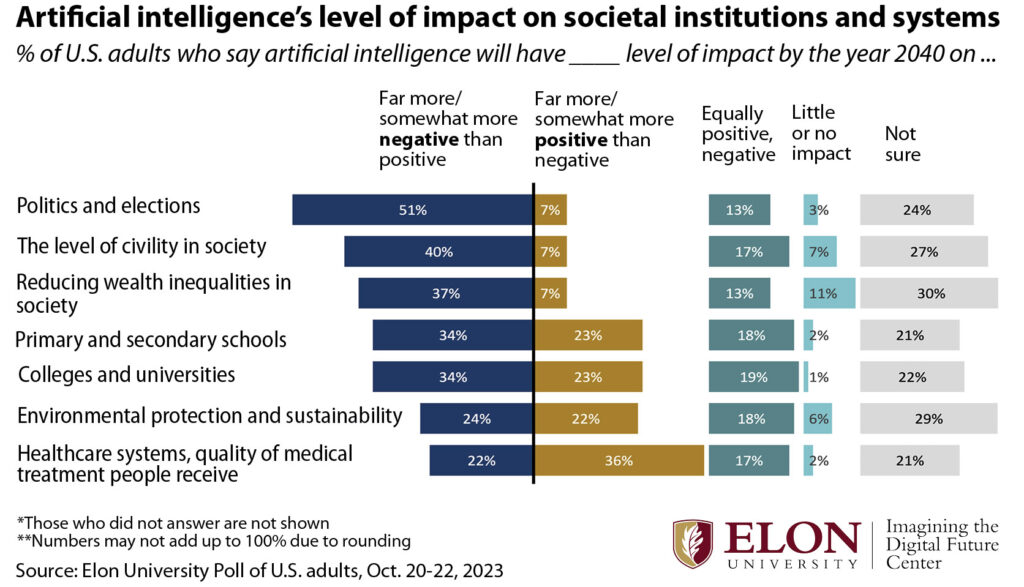Americans are more likely than not to hope AI will improve the nation’s healthcare systems and the quality of medical treatment by 2040. Still, they have deep concern that AI will negatively impact politics and elections and further erode the level of civility in society. They also are concerned that the level of wealth inequality will continue to grow.
Adults’ opinions are more evenly split about the impact of AI on K-12 education and colleges and universities, as well as issues related to environmental protection.
On each of the issues we queried, about a quarter or more of Americans say they are not sure what the impact of AI will be on societal systems, or they expect little or no impact.

The chart depicts the level of impact that artificial intelligence is expected to have on various social institutions and systems in the United States by the year 2050, according to a survey conducted by the Elon University Poll in October 2023. The chart shows the percentage of U.S. adults who believe that artificial intelligence will have a positive or negative impact on these institutions and systems.
Here is a breakdown of the results for each category:
Politics and elections: 51% of respondents believe AI will have a positive impact, 7% believe it will have a negative impact, 13% believe the impact will be equally positive or negative, 3% believe the impact will be slightly more negative than positive, and 24% are not sure.
The level of civility in society: 40% of respondents believe AI will have a positive impact, 7% believe it will have a negative impact, 17% believe the impact will be equally positive or negative, 7% believe the impact will be slightly more negative than positive, and 27% are not sure.
Reducing wealth inequalities in society: 37% of respondents believe AI will have a positive impact, 7% believe it will have a negative impact, 13% believe the impact will be equally positive or negative, 11% believe the impact will be slightly more negative than positive, and 30% are not sure.
Primary and secondary schools: 34% of respondents believe AI will have a positive impact, 23% believe it will have a negative impact, 18% believe the impact will be equally positive or negative, 2% believe the impact will be slightly more negative than positive, and 21% are not sure.
Colleges and universities: 34% of respondents believe AI will have a positive impact, 23% believe it will have a negative impact, 19% believe the impact will be equally positive or negative, 1% believe the impact will be slightly more negative than positive, and 22% are not sure.
Environmental protection and sustainability: 24% of respondents believe AI will have a positive impact, 22% believe it will have a negative impact, 18% believe the impact will be equally positive or negative, 6% believe the impact will be slightly more negative than positive, and 29% are not sure.
Healthcare systems, quality of medical treatment people receive: 22% of respondents believe AI will have a positive impact, 36% believe it will have a negative impact, 17% believe the impact will be equally positive or negative, 2% believe the impact will be slightly more negative than positive, and 21% are not sure.
It is important to note that the numbers may not add up to exactly 100% due to rounding. Additionally, some respondents may not have answered the question for all categories.


